Photographs: Reuters M R Venkatesh
It is now free-for-all. It is the prime minister versus the finance minister versus the home minister versus the PMO versus the CBI versus the CAG versus the bureaucracy versus the corporates versus th epolitical parties.
In fact, the list of protagonists who seem to be at each other's throat seems to be increasing by the minute. And it is a bitter fight, a fight to the finish, as it were.
Or is it the other way around? Given the levels of judicial activism, notably the Supreme Court on such matters, one suspects that each one is attempting to save oneself. In the process, is the damage to their colleagues merely collateral and not diabolical as it is widely perceived?
Whether one is doing all this under some covert political compulsions or implicitly attempting to defend oneself is left to the imagination of the reader.
The net result: confusions, contradictions and conflicts.
. . .
2G scam: Some questions without answers
Photographs: Reuters
In the process, several questions remain unanswered to this day on the 2G scam. For instance, even after approximately two years after the First Information Report was filed on this matter, we do not know for sure even to this date as to what is the official policy of the government.
Was it to auction spectrum? Or was it to allot spectrum on a first-come, first-serve (FCFS) basis? If so, was it to be done at prices determined in 2001?
Simultaneously, to this day we are unclear about FCFS. First come yes, but where -- to the minister? And first serve whom? The minister's interests?
If allocation and not auctioning of spectrum was the policy of the government, why then was it subsequently changed to auction for 3G? If spectrum for 2G can be allocated at 2001 prices why not allocate the same for 3G using it as a benchmark?
. . .
2G scam: Some questions without answers
Photographs: Reuters
Such a shift in the policy is akin to allotting three-tier berth in trains on FCFS basis and AC two-tier berths through auctions.
What is interesting is that we are repeatedly told that the government did not go in for the auction of spectrum for 2G to improve tele-density in the country.
If improving tele-density was the avowed objective, what is the benchmark? At what level of tele-density will the government auction spectrum? And that is the crux of the issue.
Bizarre facts, panic reaction
Can the logic of allocating spectrum in 2001, when the tele-density in the country was a mere 4 million, be cast in stone and held to be the correct one even in 2008 when the tele-density of the country was 350 million and growing at 10 million every month?
. . .
2G scam: Some questions without answers
Photographs: Reuters
Crucially, why does the government hesitate to file an affidavit in the Supreme Court putting forth its policy? Surely, in Telecom Minister Kapil Sibal (and also TRAI) they have an excellent resource who had originally propounded the zero-loss theory?
If indeed it is zero loss to the government, why is it that the former telecommunications minister, A Raja, is behind bars for the past eight months? In contrast, if it is a mere issue of procedural lapses in allocation of spectrum and licenses, where is the criminality?
In such a scenario, the issue boils down to allotting to EFGH instead of ABCD. Importantly, there would be no revenue loss to the government should the former be allotted instead of the latter.
If that be so, why then has the Central Bureau of Investigation (forget the CAG for the moment) filed documents in courts suggesting revenue loss in excess of Rs 30,000 crore (Rs 300 billion) to the revenue and arrested several people in connection with the scam?
. . .
2G scam: Some questions without answers
Photographs: Reuters
And finally, why did the Enforcement Directorate issue notices for violation of FDI (foreign direct investment) policies?
Let me hasten to remind the reader that despite two years of intensive and extensive investigation by the CBI, there are seemingly no direct evidences of money changing hands involving the former minister.
Yet, why is A Raja behind bars? Remarkably, why is he refusing to even move bail for himself?
Incompetence compounded by paranoia
It all began on November 1, 2007 when the then law minister, H R Bharadwaj, noted on a query from DOT on the subject "in view of the importance of the case and various options indicated" that the "whole issue is first considered by an empowered group of ministers." This was sent to the PMO (prime minister's office).
. . .
2G scam: Some questions without answers
Photographs: Reuters
Yet the PMO ignored this advice of the law minister. Why? Significantly, was Bharadwaj eased out of active politics and made the Governor of Karnataka simply because he dared to suggest something inconvenient?
Subsequently, Dr Subramanian Swamy petitioned the prime minister and sought his sanction to prosecute A Raja as early as November 29, 2008. Yet, the PMO chose to remain silent and did not act till matters were precipitated by Swamy through the intervention of Courts. Why?
Strangely, on November 2, 2007, the prime minister wrote to Raja requesting him to be fair and transparent and "to let me know of the position before you take any further action in this regard."
Subsequently, there were several correspondences between the two on the subject in the next 2 months.
. . .
2G scam: Some questions without answers
Photographs: Reuters
Further, on December 26, 2007, in a letter to the prime minister, Raja refers to "several discussions" with the then external affairs minister, Pranab Mukherjee, and with the prime minister himself, and provides a detailed note of his proposed decisions on the vexatious subject of spectrum allocation.
Extraordinarily, Raja claims that "he was enlightened by the external affairs minister (Pranab Mukherjee)" to take such pre-emptive and pro-active decisions to avoid any further confusions and delay.
By a remarkable coincidence on the very same day, Pranab Mukherjee too wrote a top secret note to the prime minister stating the obvious -- policy formulation revision and change is the prerogative of government. Nevertheless, he too cautions that this should be done in a transparent manner.
But these are fundamentals of governance. Why then market it to the prime minister? Was the prime minister oblivious of these fundamental issues? Why then mark it as top secret? Or was Mukherjee cautioning the prime minister against Raja?
. . .
2G scam: Some questions without answers
Photographs: Reuters
Crucially, what did the PMO do after receiving this communication?
One would have thought that the prime minister and the PMO were sufficiently warned by end of December 2007 on the possible moves by Raja and the resultant consequences.
Yet, they chose not only to remain silent but as a document released by PMO on an TRI petition reveals that the prime minister wanted to be kept at "an arm's length" on this issue.
Little do we realise that despite their best efforts the prime minister, his ministers and the UPA government are getting increasingly sucked into the vortex of 2G scam.
. . .
2G scam: Some questions without answers
Photographs: Reuters
And that is where the incompetence within government is giving way to paranoia.
No wonder, an innocuous note -- office memorandum dated March 25, 2011 -- prepared by a low ranking official in the finance ministry and "seen" by the finance minister was enough to paralyse the government for a week.
Mercifully the 'crisis' was blown over by an equally insipid statement made out by the finance minister. However, what is crucial to note here is that the finance minister, while distancing himself from the note, has not disapproved the contents or its conclusions.
And therein lies the rub. The Department of Economic Affairs (DAE) in the ministry of finance (MoF) had argued way back in November 22, 2007 that "it is not clear how the rate of Rs 1,600 crore (Rs 16 billion) determined as far as in 2001, has been applied for a license given in 2007 without indexation, let alone current valuation."
. . .
2G scam: Some questions without answers
Photographs: Reuters
What is so spectacular about the MoF note of March 25, 2011 is that the unsaid portion seems more potent than what it actually said. If one goes through the dense language, ignores the leap in logic and tolerates the usual incoherence associated with a note of a bureaucrat, it is apparent that several forces were working in tandem and simultaneously at cross purposes on this matter.
The questions raised here and the latest revelations made through the above mentioned note make it apparent that several high ranking persons -- perhaps, even at the level of the PM and his cabinet colleagues -- were in the know of these developments, not post facto, not even on real time basis but even before the drama unfolded.
It is indeed a tragedy that everyone claims now that he was not in the know of what was happening in the telecom ministry when all that is stated above was in public domain since January 11, 2008. It requires a complete suspension of our sense of disbelief to hear these arguments.
Whatever be it, increasingly the former chief minister of Tamil Nadu, M Karunanidhi, is probably getting vindicated by the day. At the height of the debate leading to the arrest of A Raja in February 2011, he said it is impossible to believe that a scam of this magnitude could have been orchestrated by Raja alone.
. . .
2G scam: Some questions without answers
Image: Former telecom minister A Raja.Photographs: Reuters
Karunanidhi is spot on. Raja was not alone. Events over the past few months have demonstrated that there were several actors in the entire saga -- some actively conniving with Raja, some passively.
But given the high positions 'they' occupy, it is impossible to believe from now on that the probe will be free and fair, and taken to a logical conclusion unless of course the Supreme Court decisively intervenes on this matter.
The author is a Chennai-based chartered accountant. Comments can be made at mrv@mrv.net.in

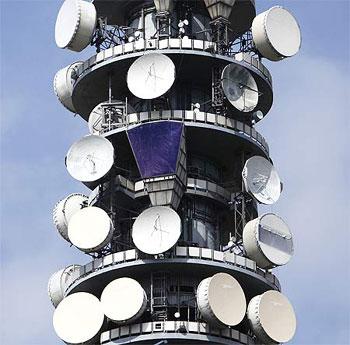

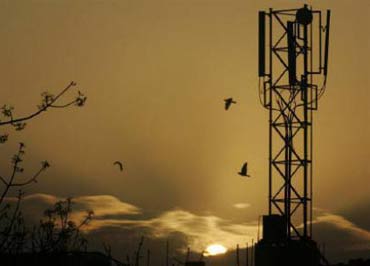
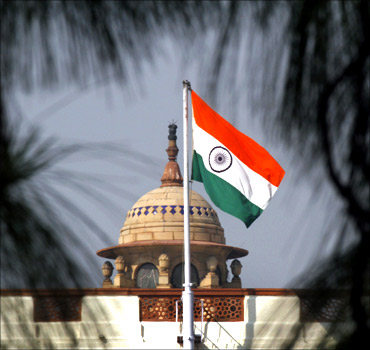

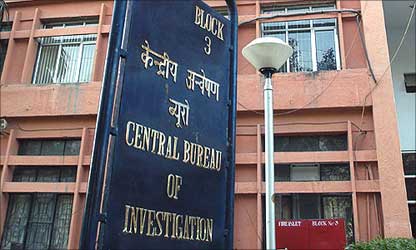
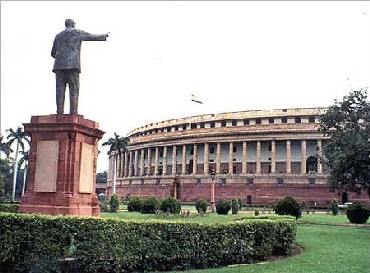

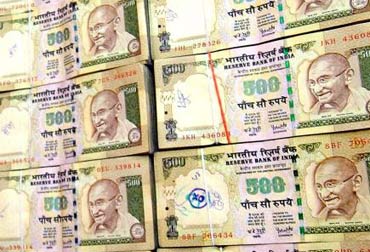
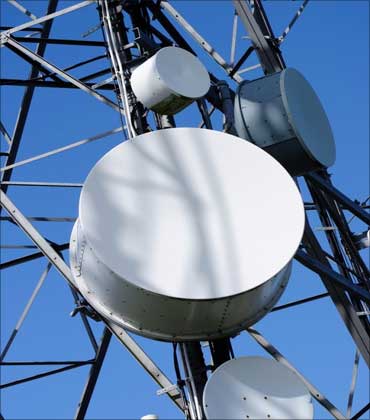
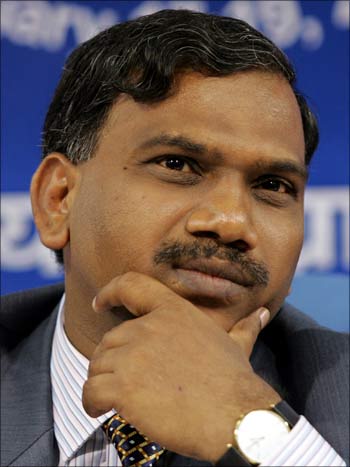
article